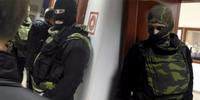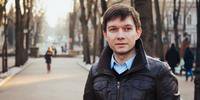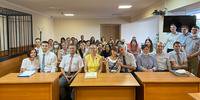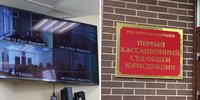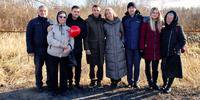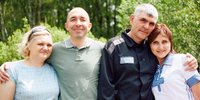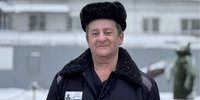The Case of Shevchuk and Others in Saransk
Filter
- #
Investigator of the Investigative Department of the FSB of Russia in the Republic of Mordovia, E. V. Makeev, initiates a criminal case for faith under Parts 1 and 2 of Article 282.2 of the Criminal Code of the Russian Federation. The suspects are Alexander Shevchuk (born in 1989), Vladimir Atryakhin (born in 1987), Denis Antonov (born in 1976), Elena Nikulina (born in 1968), Alexander Korolev (born in 1978), Georgy Nikulin (born in 1963).
According to the investigation, the believers were engaged in "spreading ideology and faith among the inhabitants of the Republic of Mordovia ... by conducting conversations in public places and living quarters with residents of the city of Saransk and other settlements", which investigators interpret as "organizing the activities of an extremist organization."
- #
- #
Vladimir Atryakhin, Aleksandr Shevchuk and Georgy Nikulin were remanded in custody. They are sent to pre-trial detention center No. 1 in the Republic of Mordovia.
- #
A criminal case is being opened against Denis Antonov under Part 2 of Article 282.2 of the Criminal Code of the Russian Federation. It connects with the case of Shevchuk and others.
- #
A criminal case under Part 2 of Article 282.2 of the Criminal Code of the Russian Federation is initiated against Aleksandr Korolev, which is combined with the case of Shevchuk and others.
- #
Investigator E. V. Makeev softens Vladimir Atryakhin's preventive measure: the believer is released from the pre-trial detention center on his own recognizance.
- #
Aleksandr Shevchuk and Georgiy Nikulin are released from the pre-trial detention center on their own recognizance.
- #
A new investigation team has been set up for the criminal case. Alexander Dolbunov is appointed its head.
- #
- #
Vladimir Atryakhin is formally charged under Part 1 of Article 282.2 of the Criminal Code of the Russian Federation (organization of extremist community activities). According to the investigation, the believer's guilt lies in the fact that he "carried out activities that, according to the Charter of the organization, are the coordination of the preaching activities of Jehovah's Witnesses in the confession and dissemination of faith, including preaching in public places and residential premises."
- #
Yekaterina Nikulina is officially charged under Part 1.1 and Part 2 of Article 282.2 of the Criminal Code of the Russian Federation (recruitment and participation in the activities of an extremist organization). The believer is accused of talking about God and the Bible. The resolution says: "Acting intentionally and illegally together with Nikulin G.N., in compliance with conspiracy measures, pursuing the goal of involving new participants in the banned organization, during repeated meetings with Sidorov G.V. (Yevgeny) and Petrov P.P. (Sergey), whose personal data are kept secret."
- #
The first court hearing begins. Judge Oksana Ledyaykina recuses herself, referring to the fact that in 2016 she considered a case of an administrative offense under Article 20.29 of the Code of Administrative Offenses of the Russian Federation against the LRO of Jehovah's Witnesses in Saransk (distribution of extremist materials). Judge Ledyaykina then found the LRO guilty and imposed a fine of 150,000 rubles.
- #
The prosecutor reads out the indictment.
All 6 defendants express their attitude to the charges. They draw the court's attention to the fact that they maintain peaceful relations with others because of biblical principles.
- #
Friends of the defendants come to the courthouse to support them.
Denis Antonov and Elena Nikulina are now represented by new lawyers. They ask for time to familiarize themselves with the case materials. The judge adjourned the hearing to the next day.
- #
The court rejects the motion of the prosecution to read out the testimony of the operational officers.
The transcripts of the interrogations of prosecution witnesses shall be read out.
- #
The prosecutor reads out the testimony of the prosecution witnesses. The defendants insist on the personal presence of three of them at the hearing.
- #
The court examines the material evidence seized from Antonov and Boyko.
- #
The secret witness "Petrov", who is in a separate room, is interrogated. The defense asks to declassify it due to the fact that the real name and surname of the witness (Sergey Vlasov) are indicated in the case file.
The judge satisfies the request of the defense, the interrogation of Sergey Vlasov continues in the courtroom.
- #
The court concludes the interrogation of the declassified witness Sergey Vlasov, which lasted for 4 sessions.
The testimony of the witness diverges from the data given earlier, in connection with which the court hears the protocols of interrogations. The defense draws attention to the fact that the prosecutor does not read out the protocols in their entirety, skipping entire paragraphs.
- #
The court is reviewing the record of the worship service of Jehovah's Witnesses.
The defendant Atryakhin comments: "At the meeting we watched, we discussed the issue of showing kindness and attention to all people ... Those present modestly discussed biblical principles and sought advice that could make a believer happier."
The defense draws attention to the statement from the audio recording: "If we do not do everything to restore peace in the congregation or in the family, then our worship of God is useless." Atryakhin emphasizes that this contradicts the statements of the witness "Petrov" (Sergei Vlasov) about calls for a break in family relations.
- #
At the court hearing, they watch and comment on the recording of the service. The defense notes that the recording emphasizes the peaceful nature of the activities of Jehovah's Witnesses, in particular, it is mentioned that "even when faced with persecution, Christians did not organize a struggle against the authorities."
- #
The review of one of the recordings of the services is completed. The defense emphasizes that there are no calls for extremism in it.
The judge grants the defense's motions to watch documentaries about bloodless methods of treatment and about the repression of Jehovah's Witnesses in the Soviet Union. The defense emphasizes that an informed refusal of blood transfusion in favor of more modern and safe methods is a legal right of a citizen of the Russian Federation.
- #
Due to computer problems, instead of watching a film about the religious repression of Jehovah's Witnesses in the USSR, the court examines the book of religious scholar Ivanenko. The defense cites quotes refuting the testimony of prosecution witness Vlasov.
- #
The defense draws attention to the fact that the name of God "Jehovah" is in various translations of the Bible and the name "Jehovah's Witnesses" is in no way connected with a legal entity.
The defendants emphasize that worship services do not depend on the presence of a legal entity. The defense also explains that the legal entity of Jehovah's Witnesses in Saransk was created for the purpose of building a religious building, and since the premises are now missing, the continuation of the activities of the LRO does not make any sense.
- #
All the defendants testify.
- #
At the hearing, the protocols of Vladimir Atryakhin's interrogations are announced. After that, the believer declares that he does not agree with the entry in the protocol that he allegedly partially admits guilt.
Investigator Makeev, who conducted interrogations of believers, is being interrogated. The prosecutor asks him about how the interrogations were conducted, whether he exerted pressure on the defendants. The prosecutor is also interested in whether lawyers were present during the interrogations and how the texts of the protocols were drawn up.
The characteristics of the defendants are announced. Despite the fact that they are read out at the request of the prosecutor, the believers are given a positive assessment.
The court completes the examination of the evidence.
- #
In the Leninsky District Court, the debate of the parties begins. The prosecutor requests 6.5 years in a penal colony for Atryakhin, 4 years and 2 months in a penal colony for the Nikulins, and 2.5 years in a penal colony for Shevchuk, Antonov and Korolev.
- #
All the defendants make their final statements.
The last word of the defendant Alexander Korolev in Saransk The last word of the defendant Alexander Shevchuk in Saransk The last word of the defendant Denis Antonov in Saransk The Last Word of the Defendant Georgy Nikulin from Mordovia The last word of the defendant Vladimir Atryakhin in Saransk Yelena Nikulina's last word in Saransk court - #
- #
It becomes known that the convicts were taken to pre-trial detention center No. 1 in Saransk. Believers can send letters by regular mail.
- #
- #
It becomes known that believers from Saransk are being moved to places where they are serving their sentences. Vladimir Atryakhin and Georgy Nikulin will serve their sentences in one of the colonies of the Republic of Mari El. Elena Nikulina was allegedly sent to a women's colony in Mordovia. Aleksandr Shevchuk, Denis Antonov and Aleksandr Korolev will serve their sentences in Penal Colony No. 12 in Mordovia.
So far, none of the believers can receive letters.
- #
Vladimir Atryakhin and Georgy Nikulin are taken to colony No. 3 in the Republic of Mari El, where they will serve their sentences. They are in quarantine, but they can already write letters.
- #
It becomes known that Elena Nikulina arrived at the correctional women's colony No. 2 in the Republic of Mordovia, where she will serve her sentence. She can write letters.
- #
It becomes known that Aleksandr Shevchuk, Denis Antonov and Aleksandr Korolev arrived at Correctional Colony No. 12 in the Republic of Mordovia to serve their sentences. They can write letters.
- #
Another 38 people are being held in the barracks with Oleksandr Shevchuk. The believer has not yet been given the necessary medicines (he suffers from a serious chronic illness).
Due to the need for ophthalmic treatment, Shevchuk is temporarily transferred to a medical institution in the village of Barashevo.
- #
It turns out that Aleksandr Shevchuk was transferred back to colony No. 12 in the Republic of Mordovia.
- #
In the colony, the doctor reveals angina pectoris, exhaustion and dehydration in Elena Nikulina. In this regard, she is sent to medical correctional facility No. 3 in the village of Barashevo (Mordovia). For this reason, she is temporarily unable to receive letters.
- #
Elena Nikulina was transferred back from the medical correctional institution to the colony. Thanks to the adjusted therapy, she feels better. During the two months of imprisonment, Yelena lost about 20 kg.
Together with the believer, there are more than 50 other prisoners in the barracks. Relations with them, as well as with the administration of the colony, are normal. Conditions are generally satisfactory, but there is often no water in the barracks. On weekends, prisoners are forced to watch lectures on television.
Elena works in the sewing workshop full-time, and in the evening she can be entrusted with additional household work. She gets tired of hard work, as well as noise in the workshop. In the colony, only registered letters are given to her. Elena is still unable to correspond with her husband George, although she submitted an application to the administration. The believer has a Bible in the Synodal translation.
- #
Vladimir Atryakhin and Georgy Nikulin, who are serving sentences in a penal colony, maintain a positive attitude. Vladimir feels good, does not complain about his health. Giorgi has health problems. Believers can exercise three times a week and thus support themselves. There are no problems with nutrition. It is also possible to buy the necessary products in the store.
The attitude towards prisoners is generally good. Alexei Berchuk from Blagoveshchensk, who is also serving a sentence in this colony, and Vladimir Atryakhin are kept together, their beds are nearby.
Believers have a Bible and the opportunity to periodically call their loved ones, they regularly receive letters.
Vladimir Atryakhin is valued as a good worker. For example, he was able to repair a faulty computer-controlled woodworking machine. The believer works in the workshop, where the first shift is from 8:40 to 17:30, the second is from 18:00 to 21:30. Also, for exemplary behavior, Vladimir was transferred to easier conditions of detention, thanks to which he receives visits with his wife and children more often.
An open day was recently held in the colony. The believers were visited by their friends and acquaintances.
- #
- #
- #
Elena continues to work in the sewing workshop, since February a 6-day working week has been introduced in the colony. Due to hard work, the believer's left arm goes numb. The neurologist prescribed her treatment, due to which the pain is slightly dulled, but in general there is no special improvement. Due to the fact that Elena is a professional seamstress, she is not transferred to another job.
The barracks and shop are noisy. Until the end of the day, prisoners can only sit on a stool, they are not allowed to sit or lie down on the bed.
Elena supports letters. Due to her busy schedule, she is unable to answer each one, but she is grateful for the support. She also managed to get permission to correspond with her husband, who is serving a sentence in another colony and whom they have not seen for a year and a half.
The believer is regularly visited by her relatives. The attitude towards her on the part of the administration of the colony is good. Other prisoners treat her with respect.
- #
- #
Yelena continues to work in the sewing workshop, but often gets tired. Her relatives manage to give her the necessary medicines. Living conditions are satisfactory, but Yelena is depressed by the ubiquitous-sounding obscene language.
She finds solace in reading a Bible borrowed from the library and in observing the birds and flowers, two sunflowers that grow on the grounds of the colony. She is very supportive of her letters.
In June, Yelena received two penalties.
- #
The court establishes administrative supervision over Aleksandr Korolev for a period of 8 years. A believer released from the colony is forbidden to attend mass events, must be at the place of registration from 22:00 to 06:00, and also appear once a month at the internal affairs body at the place of residence. Korolev intends to appeal this decision.
- #
The conditions of Vladimir Atryakhin's detention in the colony are satisfactory. He is respected by the administration and other prisoners. He still has the opportunity to call and meet with his wife.
- #
Yelena Nikulina has difficulties receiving letters in the colony: they are rarely received and not everyone passes the censorship. There are problems with water in the barracks. Recently, I had a long date with my sister.
- #
- #
Elena Nikulina still works in the sewing workshop. In early November, she was transferred to the interoperational product quality control. The working day lasts 12 hours with 1 day off every 2 weeks. In the previous place, it was even more difficult, but the believer still gets tired physically and emotionally.
There are 75 people in the unit. Due to the lack of bathrooms and places in the dining room, you constantly have to wait in line, and only 5 minutes are allotted for eating. Bath day — twice a week. The only washing machine often does not work, and about 20 minutes are allotted for manual washing of personal belongings. Bed linen and towels can be taken to the communal laundry.
Elena is supported by friends and family: letters come from different countries, parcels from different cities. The believer helps some prisoners out in everyday life and tries to emotionally support those who are not visited by their relatives. All this earns her the respect of others.
Elena's health improved: at the beginning of the term, she sometimes lost consciousness and lost 30 kilograms in the first year, but thanks to the necessary medication and regular examinations, her condition stabilized and her weight gradually returned to normal. Once a year, she undergoes planned treatment in the hospital. She needs dental care.
Elena's husband, Georgiy Nikulin, who was recently released from the penal colony, said: "I regularly wrote letters to my wife directly to the penal colony and through relatives. Unfortunately, due to the difficult conditions of her stay, she wasn't able to answer. Due to travel restrictions, I can't visit her. But I am really looking forward to meeting her."
- #
Vladimir Atryakhin was granted an extended visit from his wife. The believer is in good physical and emotional state: he eats on time, does physical exercises and plays football. He is respected by both his cellmates and the staff of the penal colony. Vladimir lives in a barracks designed for 16 people. He receives many letters.
